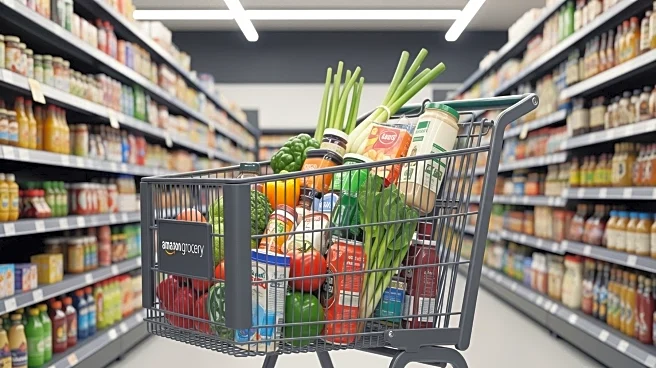What is the story about?
What's Happening?
Amazon has introduced a new private label brand, Amazon Grocery, aimed at competing with major retailers like Costco and Walmart in the cost-conscious grocery market. The brand consolidates Amazon Fresh and Happy Belly products under a single label, offering over 1,000 items, most priced under $5. This move comes as private label brands gain popularity, accounting for about 25% of grocery purchases in the U.S. last year. Amazon reported a 15% increase in private-brand product sales in 2024 compared to the previous year. The Amazon Grocery line includes a variety of products such as milk, produce, meat, and seafood, with new additions like bakery cinnamon rolls and refrigerated pizza dough. The launch is strategically timed before Amazon's Prime Big Deal Days event, potentially boosting interest and sales.
Why It's Important?
The launch of Amazon Grocery is significant as it reflects the growing trend of consumers opting for private label brands, which are often cheaper than name brands. This shift is driven by rising prices, prompting shoppers to seek cost-effective alternatives. Amazon's move could strengthen its position in the grocery sector, enhancing brand affinity and consumer loyalty. The timing of the launch, coinciding with a major sales event, suggests Amazon is leveraging its platform to maximize exposure and sales. This development could impact competitors like Costco and Walmart, who also rely heavily on private label products to attract budget-conscious consumers.
What's Next?
Amazon is expected to promote the Amazon Grocery line during its upcoming Prime Big Deal Days event, potentially offering discounts and deals to entice shoppers. The company may also integrate these products into online shopping experiences, suggesting them as additions to customers' carts. As Amazon continues to expand its grocery offerings, it may introduce more products under the Amazon Grocery brand, further solidifying its presence in the market. Competitors may respond by enhancing their own private label strategies to maintain market share.
Beyond the Headlines
The introduction of Amazon Grocery highlights the broader trend of retailers emphasizing their private label brands to build consumer loyalty. This strategy not only offers cost savings to consumers but also allows retailers to differentiate themselves in a competitive market. As private label products become more prevalent, they could influence consumer perceptions and shopping habits, potentially leading to long-term shifts in the grocery industry.















